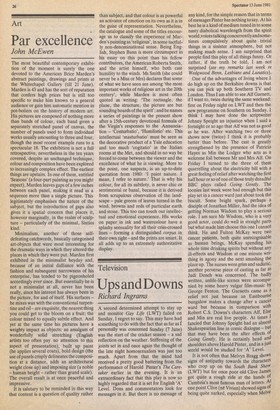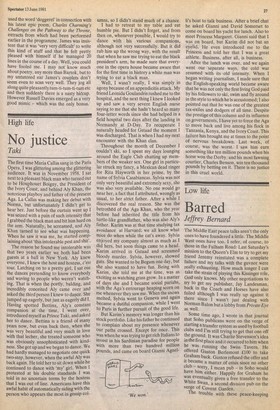Television
Ups and Downs
Richard Ingrams
A second determined attempt to stay up and monitor Gay Life (LWT) failed on Sunday, I regret to say. This may have had something to do with the fact that as far as I personally was concerned Sunday (7 June) was the start of the cricket season — a sad reflection on the weather. Stiffening of the joints set in and once again the thought of the late night homosexualists was just too much. Apart from that the mind had received a pretty good battering from . the performance of Harold Pinter's The Caretaker earlier in the evening. It is an extraordinary fact that this play is now so highly regarded that it is set for English `A' Level. Dons and commentators look for messages in it. But there is no message of any kind, for the simple reason that in terms of messages Pinter has nothing to say. At his best he is a kind of medium tuned in to some nasty diabolical wavelength from the spirit world ,voices talking concurrently and sometimes compulsively about quite trivial things in a sinister atmosphere, but not making much sense. I am surprised that people find this play of all things funny. Or rather, if the truth be told, I am not surprised (see my remarks last week re Wedgwood Benn, Lesbians and Lunatics).
One of the advantages of living where I do high up on the Berkshire downs is that you can pick up both Southern TV and London. Thus! am able to see Alf Garnett, if I want to, twice during the same weekend: first on Friday night on LWT and then the new programme on Southern on Sunday. I think I may have done the scriptwriter Johnny Speight an injustice when I said a fortnight or so ago that Alf was not as good as he was. After watching two or three shows now (twice) I think it is probably better than before. The cast is greatly strengthened by the presence of Patricia Hayes as Min the Lodger who acts as a welcome foil between Mr and Mrs Alf. On Friday I turned to the three of them quarrelling about the electricity bill with a great feeling of relief after watching the first half hour or so of one of those truly dreadful BBC plays called Going Gently. The loonies last week were bad enough but this play set in a cancer ward just about took the biscuit. Some bright spark, perhaps a disciple of Jonathan Miller, had the idea of getting Norman Wisdom to play a serious role. I am sure Mr Wisdom, who is a very good actor, could do well in straight parts but what made him choose this one I cannot think. He and Fulton McKay were two cancer patients, both quite unrecognisable as human beings, McKay spending his whole time drinking spirits but without any ill-effects and Wisdom at one minute writhing in agony and the next smashing the place up. The nurses were grim and sadistic, another perverse piece of casting as far as Judi Dench was concerned. The badly written, unlife-like scenes were accompanied by some heavy vulgar film-music by George Fenton. The Garnetts came as a relief not just because an Eastbourne bungalow makes a change after a cancer ward but because in comparison with , Robert C.S. Downs's characters Alf, Else and MM are real live people. At times I fancied that Johnny Speight had an almost Shakespearian line in comic dialogue — but that may have been the after effects of Going Gently. He is certainly head and shoulders above Harold Pinter, and in a just world would be studied for `A' Level.
It is not often that Melvyn Bragg shows signs of antipathy towards the characters who crop up on the South Bank Show (LWT) but for once poor old Clive James got quite a rough ride at the hands of Cumbria's most famous man of letters. At one point Clive (ne Vivian) showed signs of being quite narked, especially when Mel '/C used the word 'doggerel' in connection with his latest epic poem, Charles Charming's Challenges on the Pathway to the Throne, extracts from which had been performed earlier in the programme. James was insistent that it was 'very very difficult' to write this kind of stuff and that he felt pretty pleased with himself if he managed 20 lines in the course of a day. Well, you could have fooled me. I may not know much about poetry, any more than Bartok, but to my untutored ear James's couplets don't seem even to scan very well. They jog all along quite pleasantly tum-ti-tum-ti-tuni etc and then suddenly there is a nasty hiccup. However Russell Davies emerged as a very good mimic — which was the only bonus.







































 Previous page
Previous page